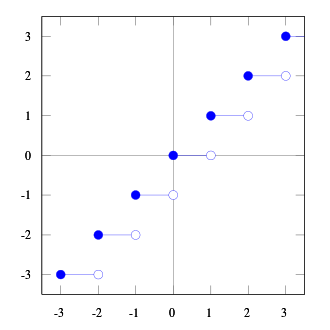Integer-valued function
This article relies largely or entirely on a single source. (June 2013) |

| Function |
|---|
| x ↦ f (x) |
| History of the function concept |
| Types by domain and codomain |
| Classes/properties |
| Constructions |
| Generalizations |
| List of specific functions |
In mathematics, an integer-valued function is a function whose values are integers. In other words, it is a function that assigns an integer to each member of its domain.
The
Any function with
Examples
Integer-valued functions defined on the domain of all real numbers include the floor and ceiling functions, the Dirichlet function, the sign function and the Heaviside step function (except possibly at 0).
Integer-valued functions defined on the domain of non-negative real numbers include the integer square root function and the prime-counting function.
Algebraic properties
On an arbitrary
Uses
Graph theory and algebra
Integer-valued functions are ubiquitous in
Integer-valued polynomials are important in ring theory.
Mathematical logic and computability theory
In
Computability theory is essentially based on natural numbers and natural (or integer) functions on them.
Number theory
In number theory, many arithmetic functions are integer-valued.
Computer science
In
See also
- Integer-valued polynomial
- Semi-continuity
- Rank (disambiguation)#Mathematics
- Grade (disambiguation)#In mathematics
References
- ISBN 978-0-471-43334-7.

